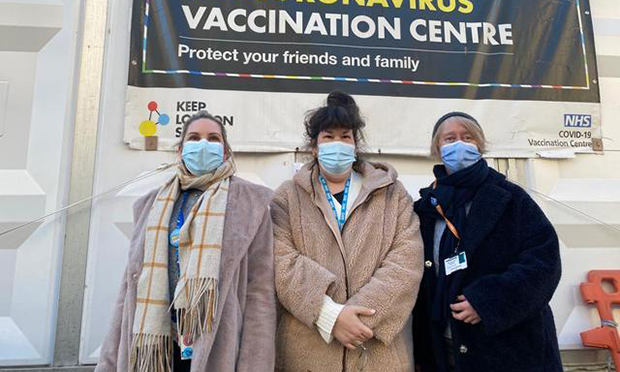‘There’s a good reason for this’: Two local nurses on vaccine hesitancy and efforts to make the jab a ‘positive experience’

“I spent an hour and a half giving someone the vaccine,” recalled nurse Gemma Evans.
“When she had it I felt relief, she was so relieved and she felt very proud of herself.”
Whilst most people are not fans of vaccines, it holds fear for some and has prevented residents coming forward.
The team at Hackney’s vaccine centres are keen to reassure people that they will be given as much support as possible to help them get vaccinated.
Evans has 10 years’ experience of giving people vaccines at travel clinics and giving them to children.
She said: “As a nurse you are used to very hesitant people.”
Her colleague Gemma Davies agrees. Before joining the team at the Hackney vaccine centres, she was working at the mass centre at ExCel in east London.
She was also a nurse at the Homerton and North Middlesex hospitals, and explained how the team are determined to make a Covid vaccine a good experience.
The pair are the clinical leads for City and Hackney’s primary care network.
Evans said: “There are a lot of people who are genuinely scared of having injections.”
She explained how one resident was “petrified and was screaming”.
“We will put the time in to support them,” she added.
Nervous patients can lie down and the team might use distraction techniques, perhaps by chatting about something else or encouraging the patient to watch a video.
“The vaccination itself is really unpainful,” said Davies. “Once you do it, they are quite surprised.”
The vaccine team also includes medical students who have already given “thousands of vaccines before coming here”.
“We have a huge wealth of experience. If someone is really scared, there is always someone to take the time with them.”
The nurses said: “There’s a really good reason for doing this. People are helping their friends and family by doing this.
“Tetanus and smallpox are not around because we have a vaccine.”
People with a history of vaccine nerves can bring someone with them to distract them.
One woman in her 50s brought her husband to support her.
“We’ve had people had hypnosis before they came.”
Parents can also help by ensuring their children keep their arms still, they said.
Jane Tyler, vaccines volunteering manager for Hackney Volunteer Centre, explained that when people arrive they are asked if they are concerned about the vaccine and if they have any problems with needles.
Hackney has vaccine centres at Bocking Street in the centre of the borough and at the John Scott health centre in Green Lanes in Woodberry Down. There are also pop-up clinics, pharmacies and GP surgeries in the borough where jabs are done.
Spring Hill surgery in Stamford Hill is running vaccine clinics every Sunday in January from 10am to 6pm.
Homerton Hospital runs vaccine clinics at Clifden Road and at St Leonard’s Hospital in Nuttall Street.
Evans advised people to tell the team if they are nervous.
“We can fast track people and draw the liquid before they meet their vaccinator.”
She added that people are always welcome to visit – following Covid safety guidance – and find out more.
“Sometimes people have hovered and maybe go away and come back,” she said.
“Nobody really loves it,” she added.
Other nervous people have been advised to go around the block and return.
As the race to protect as many people as possible continues, the vaccine is being given to younger residents, including children with special needs.
“We are getting a lot of children coming in now and it might be their first vaccine,” said Davies.
Vaccinators use bubbles and other distraction techniques to help them.
Davies recalled how she could not vaccinate one boy, so gave his mother her number so he could be vaccinated when he was ready.
Vaccine teams have visited Hackney schools, but a lot of appointments are being offered after school.
City of London and Hackney’s director of public health Sandra Husbands said parents often like to accompany their children for the vaccine.
Children and adults are also given stickers, if they’d like them.
“As a health professional, it’s one of the biggest buzzes you have being able to give [the vaccines] and help protect people from Covid,” said Evans.
Davies said we could move into a new era where these Covid vaccines become quite normal.
Children will also have a range of vaccines against illnesses, such as the MenB vaccine to give them protection against potentially deadly meningitis and sepsis. Teenagers are offered the human papillomavirus or HPV vaccine.
“We are really shaping the future of their experience,” said Davies.
“This can be the first vaccination for some people. We need to make it a positive experience.”
Find out where to get your vaccine here.
